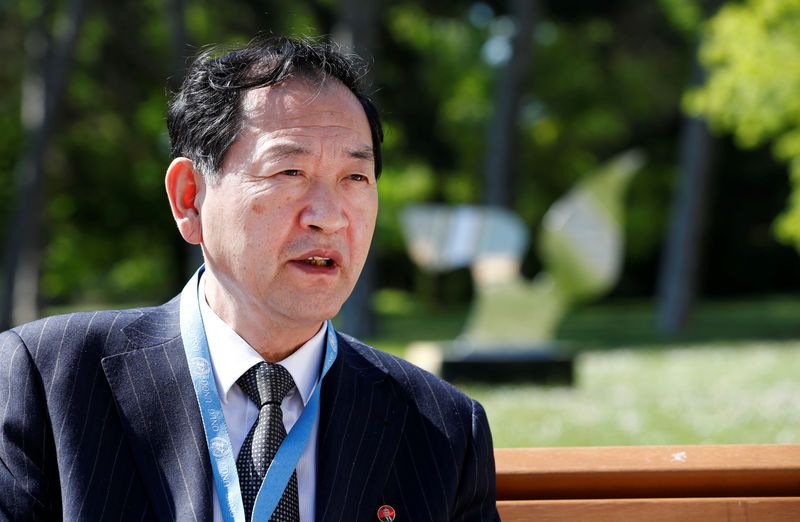By Stephanie Nebehay
GENEVA (Reuters) - The U.S. seizure of a North Korean cargo ship is the biggest stumbling block to improving bilateral relations, a senior North Korean official said on Wednesday, warning Washington against using the "logic of strength" against Pyongyang.
The Trump administration must make a "big decision" on lifting sanctions before stalled nuclear negotiations can resume, Han Tae Song, North Korea's ambassador to the U.N. in Geneva, added in an interview.
"It would be the greatest miscalculation if America thought my country is among the countries where American-style logic of strength or pressure might work," Han, who is also North Korea's disarmament ambassador, told Reuters.
North Korea, under U.S. and U.N. sanctions for its nuclear and missile programs, has stepped up a campaign for the return of the ship, which Washington says it seized over accusations it was used for coal shipments in violation of the curbs.
The country has warned Washington that the impounding of the "Wise Honest" ship had violated its sovereignty and could affect "future developments" between the two countries.
"Yes, (it is) the biggest issue," Han said of the vessel, which U.S. officials say is en route to American Samoa. "It is because it is the infringing upon the sovereignty of our country."
Han described the seizure as a "wanton violation of international law" and demanded its immediate return.
Han said he had no information on its cargo, but on the consequences of a U.S. failure to return the ship, he said: "We don't want, the Americans also don't want and the international community don't want the situation again worsening."
At their second summit meeting in February, talks broke down between U.S. President Donald Trump and North Korean leader Kim Jong Un, stalling moves toward denuclearization.
Han said his country's short-range missile tests carried out earlier in May were a "routine checking of our national defense capabilities", indicating that they would continue.
"WE ARE NOT OBSESSED" OVER MORE TALKS
The U.N. Security Council has unanimously strengthened sanctions on North Korea since 2006 in a bid to choke funding for Pyongyang’s nuclear and ballistic missile programs, banning exports including coal, iron, lead, textiles and seafood, and capping imports of crude oil and refined petroleum products.
Asked whether North Korea was ready to resume nuclear negotiations with the United States, Han referred to Kim's speech to the Supreme People's Assembly in April.
"If they don't change their minds, if they don't make a big decision, we are not obsessed over another round of talks with the USA, out of (being) thirsty for lifting sanctions," Han said.
"That's why our leader said that if they made a big decision, there will be another round of talks with America."
Han said that North Korean grain production was lower last year following drought, leading to a "shortage of food".
U.N. agencies, including the World Food Programme (WFP), are providing food assistance, from donor contributions, he said.
"If there is food aid, it's ok. But if there is no food aid, then we have to manage ourselves."
Asked whether the food shortages were manageable, he replied: "It is manageable, but the problem is U.N. sanctions.
"We can't transact for importing the food through banking systems, that is the main problem."
